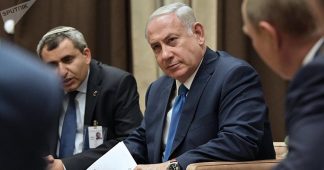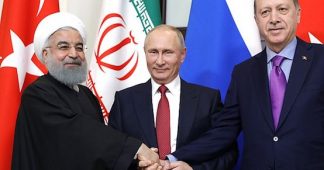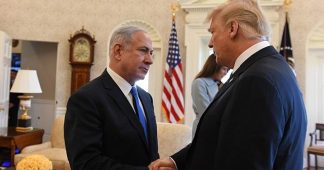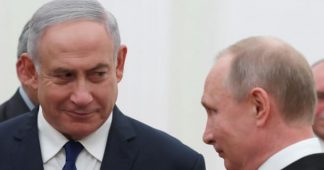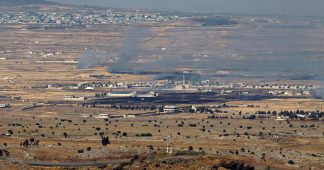Tensions over Syria deepen following Helsinki summit
By Bill Van Auken
18 July 2018
Amid the hysterical denunciations of President Donald Trump by the US media, the Democrats as well as Republicans, and prominent spokesmen for the US intelligence apparatus for his failure to confront Vladimir Putin over alleged Russian “meddling” in the 2016 election, the Helsinki summit was celebrated in at least one quarter.
The government of President Benjamin Netanyahu and the Israeli press greeted statements by both Trump and Putin in support of Israeli security and interests in Syria as a diplomatic triumph.
During their joint press conference, Trump and Putin, representing governments that have supported opposite sides in the bloody seven-year-old US-backed war for regime change, expressed their commitment to Israel’s security as well as its interests in the Syrian conflict.
Boasting that no American government has ever had closer relations to the Israeli government than his administration, Trump continued: “President Putin also is helping Israel. And we both spoke with Bibi Netanyahu, and they would like to do certain things with respect to Syria having to do with the safety of Israel. So in that respect, we absolutely would like to work in order to help Israel, and Israel will be working with us. So both countries would work jointly.”
For his part, Putin said that he and Trump had paid “special attention” to the issue during their one-on-one talks, adding that the “crushing of terrorists” in southwestern Syria “should be brought to the full compliance with the Treaty of 1974 about the … separation of forces of Israel and Syria. This will bring peace to Golan Heights and bring a more peaceful relationship between Syria and Israel, and also to provide security of the state of Israel.”
Netanyahu had traveled to Moscow on the eve of the Trump-Putin meeting in Helsinki, apparently pressing Moscow to curtail the presence of Iranian-backed forces in Syria and particularly in the south of the country near the Israeli border.
Putin’s invocation of the ceasefire agreement that ended the 1973 Arab-Israeli War, leaving the bulk of the Golan Heights under Israeli occupation while creating a UN-monitored demilitarized zone, appeared to be aimed at meeting Israel’s demands, at least in southern Syria.
Israel has carried out an increasingly aggressive military campaign ostensibly aimed against Iranian-linked sites inside Syria. A missile strike on Sunday night claimed the lives of at least 22 people at the al-Nayrab air base near the Syrian city of Aleppo. Nine of the dead were reportedly Iranian citizens. The strike, the third attributed to Israel in barely a week, occurred much further north than earlier attacks.
While Moscow and Tehran have both provided military aid to the Syrian government of President Bashar al-Assad against the Al Qaeda-linked militias that have been armed and funded by US and other Western powers, along with Saudi Arabia, Turkey and Qatar, Russian and Iranian interests are by no means identical. And it is clear that Israel has to have some level of coordination with Russia in carrying out its attacks in Syria in order to avoid Russian air defense systems.
The Syrian government daily Al Watan published a column on Monday stating, “The priorities of the Syrian leadership could be different from those of its Iranian and Russian allies. It is no longer a secret that there has been a disagreement between Russia and Iran over what the priorities in Syria are. It was severe at some point … At the end, the two sides have agreed to let the opinion of the Syrian leadership be the arbitrator.”
At the same time, neither Washington nor Tel Aviv have opposed the Russian-backed campaign by the Syrian government to wrest control in the south of Syria from the so-called rebels, including in Daraa province, which had previously been declared a ceasefire zone.
There is no doubt that a major motivation for Trump’s meeting with Putin is an attempt by Washington to secure Russian collaboration in the US campaign against Iran throughout the Middle East.
Putin defended the Iranian nuclear agreement in his remarks, while Trump said he had stressed with Putin “the importance of placing pressure on Iran to halt its nuclear ambitions and to stop its campaign of violence throughout the area.”
Trump also declared that Washington “will not allow Iran to benefit from our successful campaign against ISIS.”
This statement appeared to signal that US troops will remain deployed in Syria, despite Trump’s suggestion in April that they would be withdrawn after the defeat of ISIS.
This position was made explicit by Trump’s national security adviser John Bolton on the eve of the Helsinki summit in an interview with ABC News. “I think the president has made it clear that we are there until the ISIS territorial caliphate is removed and as long as the Iranian menace continues throughout the Middle East,” he said.
Some 2,200 US troops are deployed in Syria, having established a string of bases in the eastern part of the country, where they are training anti-government militias and denying Damascus access to Syria’s oil and gas fields.
Leading figures within the Democratic Party and the military and intelligence apparatus have denounced any collaboration with Russia in relation to Syria as a betrayal of US imperialist interests and Washington’s original goal of overthrowing the government of Bashar al-Assad and installing a more pliant US puppet regime.
This was the thrust of a joint statement issued on the day of the Helsinki summit by ranking members of the Senate and House foreign relations committees, Bob Menendez and Eliot Engel, who demanded that Trump “reject any Russian demands with respect to Syria” and insisted that “If Assad remains in Syria, the fight against ISIS and other extremist groups will never end.”
Meanwhile, Washington think tanks with close ties to the Pentagon and the CIA issued statements in advance of the Helsinki meeting demanding an escalation of the US intervention in Syria.
Jennifer Cafarella, of the Institute for the Study of War, a think tank funded by major US arms corporations and led by long-time Pentagon adviser Kimberly Kagan, wrote a piece for Foreign Affairs titled “Don’t get out of Syria” that essentially argues for relaunching a war that has claimed hundreds of thousands of lives and rebuilding the Islamist rebel groups that have been defeated.
Similarly, the Washington Institute, a pro-war and pro-Israel think tank, published a piece by former Obama Middle East adviser Dennis Ross and two former ambassadors also advising against any US military withdrawal, arguing that Syria is “ground zero” in preparing for military confrontation with Iran.
It calls for a military presence “sized to the task and complemented with a no-fly/no-drive zone,” along with a renewed “understanding with Turkey in the north that would permit the United States and its allies to exercise control over 40 percent of Syria’s territory, including the country’s most resource-rich tier.”
Whatever partial agreements may have been reached between Trump and Putin relating to Syria, the drive by US imperialism is toward a far wider and bloodier war in the Middle East that will inevitably draw the world’s two major nuclear powers into conflict.
